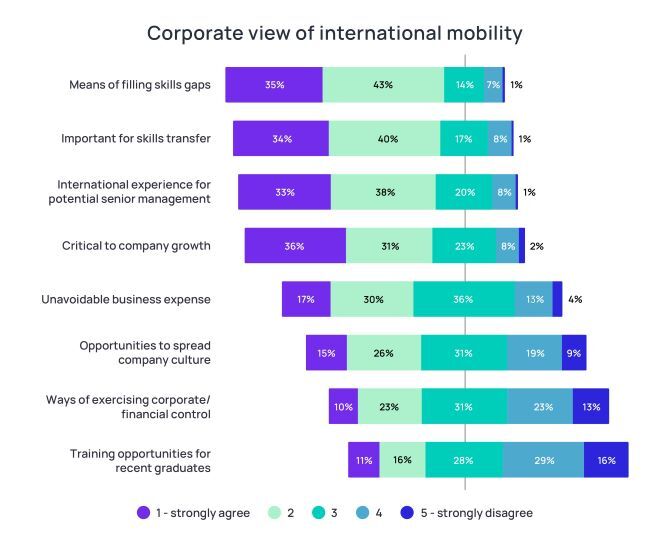Outsourcing in the global mobility world
Global mobility is shifting toward a highly targeted, strategic role in order to fill gaps in skills and provide international experience for employees who are progressing towards senior management roles. These are the findings of ECA International's 2025 Managing Mobility Survey, which found that global mobility has a high strategic value and is increasingly being recognised as crucial for expertise transfer and company growth. Marianne Curphey reports.

View your copy of the Autumn 2025 issue of Think Global People magazine
Click on the cover to access the digital edition.
ECA International reports that organisations are strategically deploying talent to address skills gaps and provide international experience for potential senior management, and there is a clear shift towards more strategic work for mobility professionals, with transactional responsibilities increasingly automated or outsourced.
Opportunities and challenges in global mobility strategies
The research reveals several significant trends including rising costs, a move towards outsourcing some of the mobility function, and a need for an upgrade in technology in order to meet the new demands of the role.The Managing Mobility Survey found that 95 per cent of firms now outsource at least one mobility function, strategically using international assignments to bridge skills gaps and fuel business growth. This is despite ongoing challenges like family-related assignment failures, rising administrative costs (up to $9,800 USD annually per long-term assignment), and slow tech adoption (only 3 per cent satisfaction with mobility tech).ECA International gathered insights from 262 organisations across 30 countries and found that many failed assignments were due to difficulties with the assignee or family settling in their new country. While money was the primary focus when employees were deciding whether or not to take up the assignment, it was often culture shock which actually derailed the assignment once they were in their new role. Family concerns remain a frequent cause of assignment failures, and they were the second most common reason for a failed assignment.“Employees or their families being unable to adapt to host locations remains a significant challenge, highlighting the importance of comprehensive support beyond financial packages,” the report said.How can the global mobility industry rise to the challenge?
Another key finding was that costs were rising for both short and long term assignments, and that it was difficult for organisation to assess the value of sending senior staff abroad. It found that administrative costs for international assignments have increased since ECA's previous survey, with average annual costs reaching USD 9,800 (EUR 9,200) per long-term assignment and USD 8,700 (EUR 8,200) per short-term assignment.“While larger programmes find efficiencies through technology and cost spreading, measuring return on investment remains problematic,” the survey said.Despite the potential time and cost savings of implementing new technology and artificial intelligence (AI) into the mobility function, many organisations were not yet taking advantage of tech. In the survey, only 3 per cent of companies reported being fully satisfied with their mobility technology.“Despite its recognised potential, AI adoption in global mobility remains tentative, with only a small minority of companies having introduced AI into their processes so far,” the survey said.What are the priorities and uses of mobility programmes?
 Managing mobility – ECA Survey Report 2025“As global mobility continues to evolve, we are seeing organisations struggle to balance transactional and strategic responsibilities,” said Oliver Browne, Head of Content and Insights at ECA International. “With 60 per cent of respondents finding this balance challenging or very challenging, there is a clear need for more efficient processes and better technology integration to free up mobility professionals for more value-added work.”
Managing mobility – ECA Survey Report 2025“As global mobility continues to evolve, we are seeing organisations struggle to balance transactional and strategic responsibilities,” said Oliver Browne, Head of Content and Insights at ECA International. “With 60 per cent of respondents finding this balance challenging or very challenging, there is a clear need for more efficient processes and better technology integration to free up mobility professionals for more value-added work.”The battle for global talent continues in 2025
The report shows how mobility teams deal with change on a daily basis, including a shift in organisational structures, new technology and different types of mobility. Yet global mobility is seen in a positive light and as an important solution to a lack of skills, as well as providing vital international experience and driving company growth.“It is no secret that international mobility is expensive, and cost issues are a significant challenge for global mobility teams,” the report says. “This is why the corporate view of mobility in most companies focuses on where it can lead to growth and fill key skills gaps, rather than on training and cultural benefits.”The survey also found that finding suitably skilled candidates for long-term international assignments remains challenging for many organisations. One solution to these difficulties lies in increasing the talent pool, with 42 per cent of companies implementing diversity policies to achieve this.ECA International’s survey covered finance, engineering and tech. It looked at the challenges of cost management, technology adoption, talent acquisition, and strategic alignment with business objectives.Key findings of the ECA International report
Time pressures are real: Finding a balance between transactional and strategic work is an ongoing issue for GM teams.A trend toward automation: In recent years, there has been a shift away from transactional work toward a more strategic focus, enabled by an increased usage of automation.Global mobility is increasingly important for business development: While more companies now report an even split between strategic and transactional work, the future suggests a move further toward strategic work taking precedence.A continued focus on assignments: Business travellers are the least likely type of mobile employee to come under GM’s remit, with less than 20 per cent of global mobility teams always being responsible for this type of employee. However, almost 40 per cent have some involvement with business travellers, and companies are leaning on GM’s expertise and experience with compliance issues.Outcomes in global mobility are hard to quantify: Measuring return on investment (ROI) ranked as the biggest mobility-related challenge in this survey. Only a minority of organisations attempt to measure ROI for international assignments.Outsourcing is commonplace: Lack of inhouse knowledge and reducing administration are key reasons, particularly for relocation and housing search. Concerns over compliance are the most common reason for outsourcing legal issues such as tax and immigration.Diversity initiatives can help solve the global talent shortage: Transferable skills continue to be highly valued when it comes to working internationally, but companies find it harder to find suitably skilled, qualified and experienced candidates for long-term assignments than for other types of move. Increasing the talent pool is one solution to these difficulties, with 42 per cent of companies having a diversity policy to achieve this.How Relocate Global and Think Global People are widening the global mobility debate
Many of the themes from ECA International’s Mobility Survey were discussed and recognised in the recent Think Global People and Relocate Awards and round table debate at the Global Leaders Forum. Fiona Murchie, Relocate‘s publisher and managing editor, brought together senior global mobility leaders, HR professionals, educators, destination service providers, tax and immigration specialists and strategists for the Global Leaders Forum: Forging a Path in Our Fragile World at the Glaziers Hall in London this month.Josh Winfield, Senior Manager, Global Mobility Consulting at KPMG, explained that global mobility is changing fast, and it is no longer just about logistics, compliance and tax. It is becoming a core part of how organisations think about talent, leadership, and global growth. Benjamin Oghene, CEO and founder of The Cozm, explained how blending intelligent automation with human insight can save global mobility teams large amounts of time and money, and how repetitive processes currently performed by humans are being done in a matter of minutes or days by AI-enabled technology.Celebrating the best in global mobility
The Think Global People and Relocate Awards 2025 brought together international leaders, mobility experts, educators, and HR professionals to celebrate the best in global mobility, leadership and education. These awards recognised the professionals, organisations, and solutions shaping the future of global talent movement. They highlighted excellence, innovation, and human-centered practices.A key theme was the strategic value of mobility policy design and implementation, as demonstrated by the Excellence in Global Mobility: Global Policy Design or Implementation, which was won by A Y & J Solicitors, a leading expert in UK immigration. The awards also showcased the critical role of destination services. Santa Fe Relocation was the winner of the Destination Services Provider of the Year Global award, while NYC Navigator won the award for Destination service provider of the year Local. Their recognition reflects the industry's growing appreciation for personalised, empathetic, and locally tailored support.The award for Best Serviced Apartment Provider, won by Synergy Global Housing, reflects the need for innovation, security, and sustainability in corporate accommodation. Another central theme of the Awards was technology and analytics as catalysts for transformation in global mobility. The Cozm’s award for Excellence in Technology highlights how data-driven insights and technological tools can improve decision-making, operational efficiency, and the overall mobility experience. Icon’s award-winning initiatives in fostering connection and inclusion between remote and office-based employees set a benchmark for leadership that puts people first, and they won the Excellence in talent management award. The Excellence in Family Support award, won by BiCortex Languages & Translations, demonstrated the importance of supporting the wider family unit in global moves.

Find out more about the Think Global People and Think Women community and events.

Subscribe to Relocate Extra, our monthly newsletter, to get all the latest international assignments and global mobility news.Relocate’s new Global Mobility Toolkit provides free information, practical advice and support for HR, global mobility managers and global teams operating overseas.
©2025 Re:locate magazine, published by Profile Locations, Spray Hill, Hastings Road, Lamberhurst, Kent TN3 8JB. All rights reserved. This publication (or any part thereof) may not be reproduced in any form without the prior written permission of Profile Locations. Profile Locations accepts no liability for the accuracy of the contents or any opinions expressed herein.







































